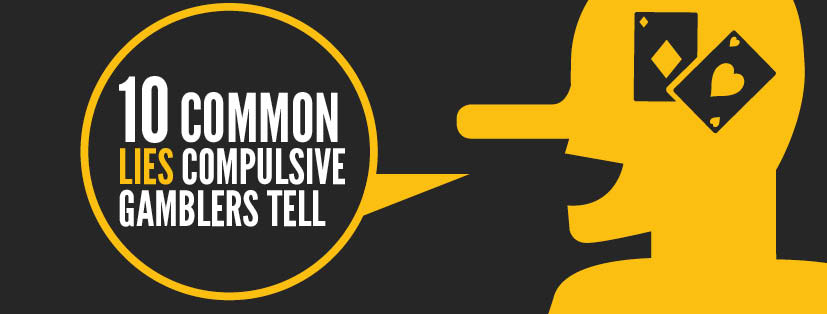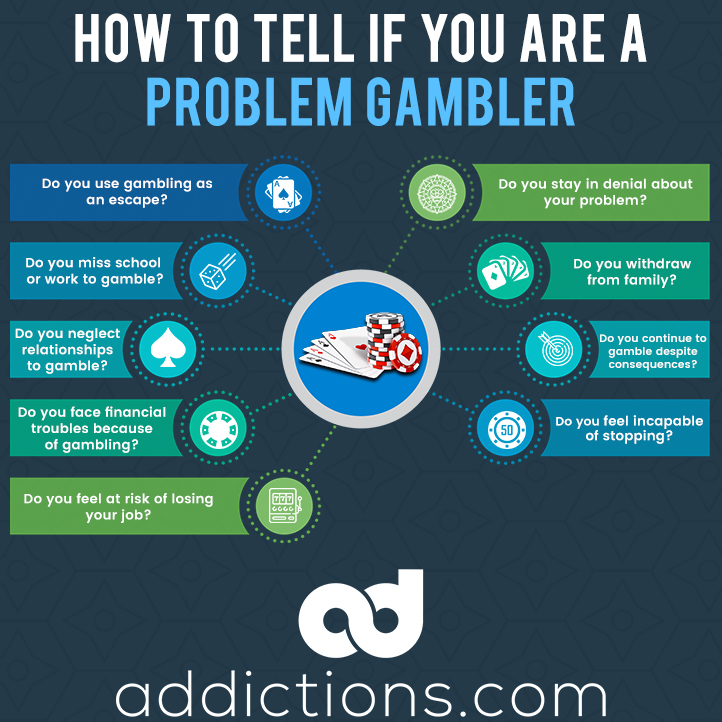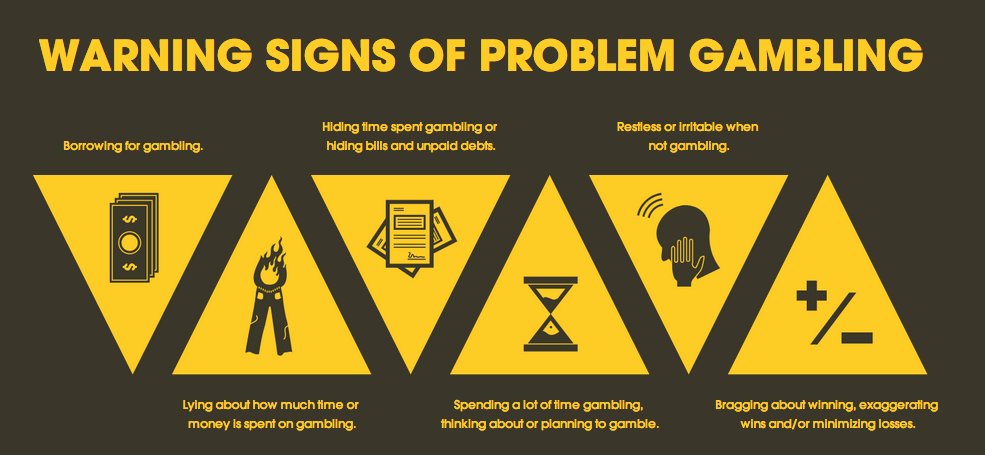Signs He Has A Gambling Problem
The signs of problem gambling. Some red flags are so obvious that they hardly seem worth mentioning, like when your friend or family member disappears into a casino for days at a time. Gambling problems share many similarities with other addictive disorders. However, there are no visible signs or physical changes that will indicate a gambling problem. Here are common behavioural, emotional, health and financial signs of problem gambling: Behavioural signs. The individual: Stops doing things he or she previously enjoyed. Your family and friends think you have a problem. Despite becoming experts at lying to cover up their gambling behaviors and financial losses, family and friends may eventually start to suspect that the gambling addict has a problem. When family and friends express concern, gambling addicts typically deny the problem. As the depth of the.
We ask Rachel Connor from debt advice charity StepChange, as part of Talk Money Week, to answer the following question. Join in the conversation on Twitter and tell us what you would advise.
Question
I’m worried about my husband and I think he may be hiding something from me. He seems to be getting more and more scary looking letters through the door, and they disappear quickly so I can’t see what they are.
When I ask him about them, he gets defensive and says they’re just junk mail. He goes out every evening pretty much, and most of the weekends too and my friend said she keeps seeing him at the local bookies.
When he’s in, he locks himself away in the spare room. He’s always been a bit of a gambler, but it's never been a problem before.

We’ve never been short of money in the past, but things keep going missing. Cash has disappeared from my purse and now my gold bracelet which my mother gave to me has gone.
I’ve searched the house top to bottom for it. I just don’t think I could ask if he’s stealing from me. Has he got us into trouble with money? Will he be truthful?
I have no idea what to do.
Anon, UK
Answer
Dear Anon,
I’m really sorry to hear about the stressful situation you’ve been dealing with. From what you’ve described, there’s a chance your husband may be dealing with a gambling addiction.
This can not only be difficult for him, but also for you, his partner. You clearly want to help him, but may be unsure how to support him in his recovery.
Gambling is a powerful addiction, so it’s important that you understand what your partner’s dealing with, and actions you can take/
According to the relationship counselling charity Relate, there are several danger signs of a gambling problem to look out for. Some of them seem to match up with what you’ve been witnessing lately. They include:
- Spending a lot of time away from the house and being vague or secretive about it. Some gamblers get up early in the morning to gamble while their partner or family are asleep.
- Becoming defensive whenever money is discussed.
- Hiding bank statements.
- Unexplained payments coming out of your bank account(s).
- Emotional highs and lows.
Even though your partner is the one facing the problem, how you feel is important, too.
Talk to someone
You’ve already mentioned that a friend’s noticed your husband’s behaviour. Do you trust this friend? Can you talk to them in confidence about how you’re feeling, or do you have anyone else you can talk to?
Having someone to share your feelings with can really help your own mental wellbeing.
Your GP can refer you and your partner to local support groups that specialise in gambling recovery. You could also encourage your partner to talk in confidence with their HR department or trade union about what they’re going through.
Is there any way to help your partner avoid the temptation to gamble? According to the Gambling Commission, there are over 8,500 betting shops in the UK. As a result, your partner may have to fight an impulse to gamble every time they walk along the local high street.
Have a think about the different gambling ‘triggers’ that may arise for them. For example:

- Can they take an alternative route to the shops, or to work?
- Are they pressured into gambling by friends or colleagues (during lunch breaks, on nights out etc.)?
- Are there any apps on their phone that encourage gambling?
Get support
Finally, tell your partner to get support from a gambling awareness charity such as Gamcare. They also offer confidential support and advice for family and friends of those with gambling problems.
You can contact them online or by phone on 0808 8020 133 every day 8am to midnight.
Your partner can even talk in confidence at local meetings held by Gamblers Anonymous. Sharing their problem with others who are seeking help with gambling can make them feel less alone.
Recovering from a gambling addition could take its toll, mentally and emotionally. Seek support for your mental wellbeing from charities such as Mind and Time to Talk.
If you have a mental health assistance scheme through your employer, then please take advantage of it. By giving yourself the support you need, you’ll be in a much better position to help your partner through recovery.
If your partner’s in debt due to gambling, we recommend that they get expert gambling advice as well as free and confidential debt advice.

If they don’t seek help with their addiction, there’s a high chance they may fall back into gambling, which could make their debt problem worse.
Citizens Advice has recently joined forces with GambleAware to offer support to gamblers who are also dealing with a debt problem. At StepChange Debt Charity we also offer free and confidential debt advice over the telephone and online.
There isn’t a one-size-fits-all solution to gambling problems, and different approaches work for different people. However, help is available and neither of you have to face the problem alone.
Signs of slot machine addiction
When gambling on a slot machine, the bond between the gambler and the machine becomes personal, no one to interfere with their gambling and no one to compete against. The player feels a fondness for a particular machine and some players even get irritated if they see someone else playing their machine. If the slot player is playing longer than he planned, spending more money than he can afford, and telling lies about how much he wins or loses, perhaps he has a problem. If s/he is concerned about his behavior while gambling and even during periods when the person is away from the casino, perhaps s/he may have a slot machine addiction. Other signs of slot machine addiction include:
1. Belief that you are not gambling with “real money”.
2. Belief that you will win back money that you lost on a slot machine.
3. Developing a personal relationship or bond with a particular slot machine.
4. Feeling irritation when you see someone else playing on “your” slot machine.
5. Playing a slot machine longer than planned.
6. Spending more money on a slot machine than you can afford.
7. Lying about how much you win or lose on a slot machine.
8. Thinking about playing the slots when you are away from a casino.
9. Problems at work, home or in a social setting due to playing the slots.
10. If you think you may have a gambling problem, you probaby do.
Slot machines are designed to be addictive
Slot machines are also known as VLTs (video lottery terminals) or pokies. The machines are designed with three or more reels that spin when a button is pushed or a handle pulled. The machines have different themes containing graphics and music from popular movies or TV show. The sounds, colors, and images on slot machines have been designed by psychologists to seduce the player and the music reinforces the addictive behavior.
Dopamine, adrenaline and slot machines
The rapid response from the machine has a hypnotic effect and stirs up the dopamine in our brains. And the speed of slot machine games keeps the gamblers’ adrenaline pumping. Even if the gambler does not win, the machine makes him feel that he almost did. And for the gambler that can be just as great a feeling as winning the jackpot. In fact, the person can sit there for hours just pushing buttons and zoning out because the games require no thought or skill. Many slot players have commented, “I just couldn’t get up and walk away.”

Signs He Has A Gambling Problem Involving
Instant gratification on slot machines
When a person gambles on slot machines they don’t have to think or plan their next move. They don’t have to wait for cards to be dealt, horses to run around a track, or the end of a sports event, to know the score. Playing the slot machines person knows instantly if he won. Even if he didn’t win, the reels show him how close he came to winning. The machine tells the player that it is ready to pay off because the images on the reels were showing us three, four or five of a kind.
Signs He Has A Gambling Problem Occurred
Slot machines are the crack cocaine of gambling
Help With Gambling Problem
Slot machines are powerful revenue-generating forces designed to keep the player spending more money. The innocence of the slot machine attracts the gambler as he walks through the casino but the slot machine addiction has been described as the crack cocaine of gambling. The money that people gamble on slot machines typically isn’t important and is treated like Monopoly money. Even when the person loses, they believe they will win back all the money they lost to the machine. To compound the losing of money, several ATM machines are located in the gambling area. But what has your experience been? Are you having trouble with slot machine use? Please share your thoughts below, and we will respond to you personally!